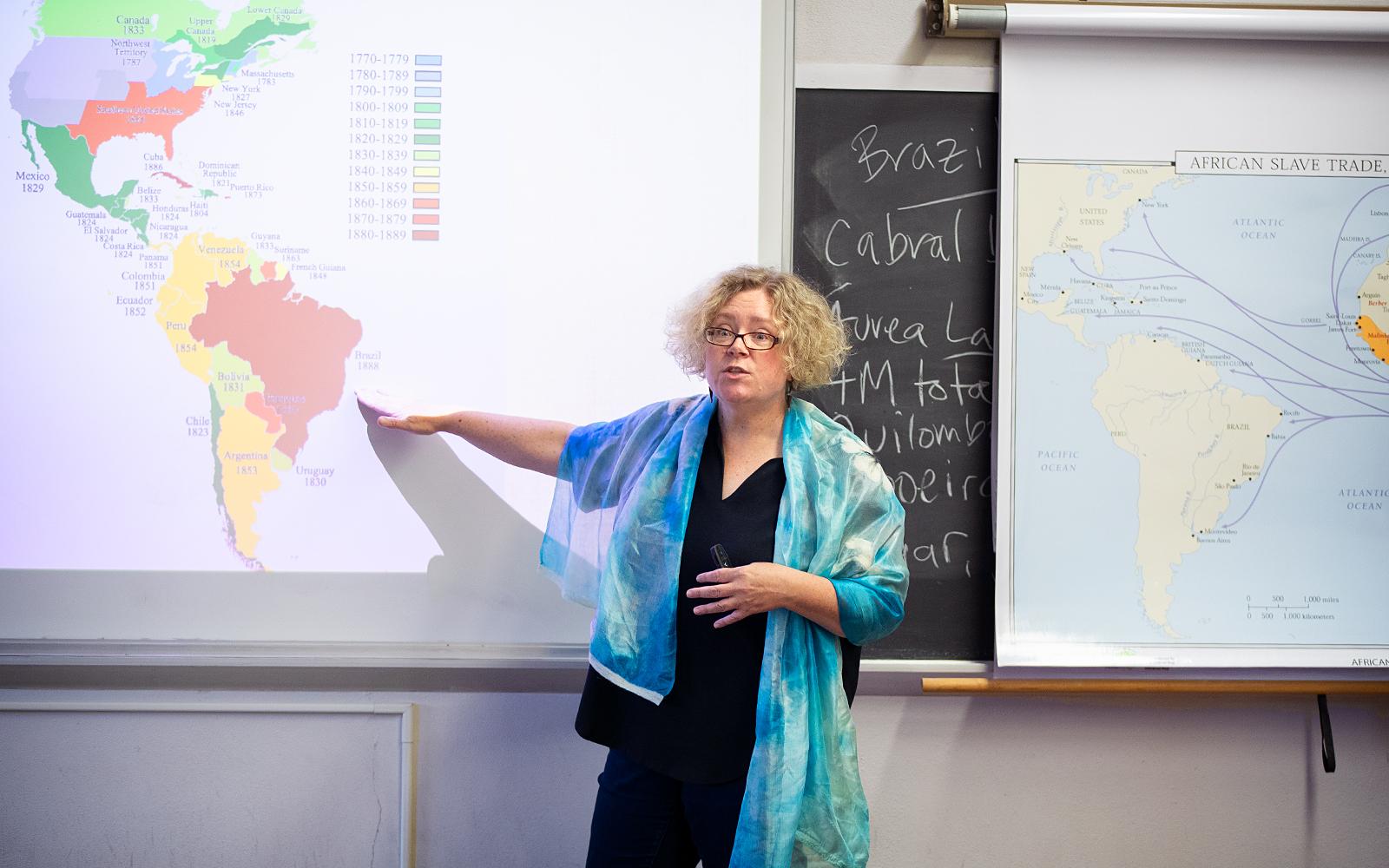History professor’s trip brings the Silk Road to Potsdam
Because it’s challenging for her students to travel to the other side of the planet, SUNY Potsdam Department of History Chair Dr. Libbie Freed went on the road this fall to bring the world to them—virtually, that is. With her Fall 2023 World History students trailing her through the electronic ether, Freed explored the Silk Road and the Central Asia countries of Kazakhstan, Kyrgyzstan, Tajikistan, Turkmenistan, and Uzbekistan. Students in Potsdam followed her journey westward across the region via Freed’s Brightspace and Instagram, engaging in real time with her experiences via posted assignments, photos, and reflections.
The three weeks of discovery breathed life into themes Freed covers in her courses, and they helped answer burning questions that she has had for years. In a mosaic of cultures old and new, modern and historical politics—and, importantly, food—Freed uncovered a trove of material to energize future lectures in multiple focus areas.
“Central Asia and the five former Soviet ‘-stans’ comprise a region that seems easily and startlingly often overlooked by the western public, and that’s despite the fact that so many of us are familiar with the term—if not all the history of—the Silk Road. Central Asia is not only huge, diverse, and fascinating today but also a crossroads of so much crucial history—trade, food, and science and technology to name just a few.”
A reflection on her trip
The novel method of instruction was a first for Freed, but one that’s being noticed more often around university campuses as faculty progress the innovations in online pedagogy and flexible learning that gained traction during the pandemic. Freed drew inspiration from a 2021 Greenland trip by SUNY PRODiG Fellow Dr. Kathryn Grow Allen, an assistant professor of archaeology, who brought her students along virtually on a research trip as part of her work there to help develop a digital cultural heritage project.
For her own part—and despite a lot of useful tips from Allen—Freed encountered practical challenges in navigating a lineup of authoritarian regimes and opted to book her travel with the Road Scholar group “On the Silk Road in Central Asia.” The journey took her from Almaty to Bishkek to Tashkent to Khujand to Samarkand to Bukhara to Khiva to Ashgabat. In these hubs, she met with local experts, who shared layers of nuance and context that is hard to glean from texts. She explored monuments, food preparation, historical sites, museums, and technological features. As the themes of trade are foundational to her world history classes, Freed found relevance everywhere along the fabled caravan route for the silk and spice trades.
Students completed thematic assignments, weekly quizzes on assigned readings and videos focused on Central Asia and engaged through a discussion forum post for each day that they would have been meeting as a class.
Freed’s key goals were to encourage critical thinking about Central Asia, make cultural and historical comparisons, and examine ways the trade route shaped the region. She sprinkled her instruction with lighter posts and observations and asked her students to consider how her trip would have been different 20, 100 and even 500 years ago and how it may have differed for travelers with varying identities, interests, and needs. She explored elements of packing and management of the varied and racing emotions that accompany most epic journeys.
“I really wanted to encourage students to learn about the basics and realities of travel. It’s a useful exercise whether they are planning their own student abroad experiences but also for students for whom studying abroad is not an option.”

As with many enterprises, the trip took a community to be successful. Funded by the Lougheed Center for Applied Learning, Freed’s two teaching assistants, Libby Sheldon ‘26 and Frankie Beshers ‘24, helped fine-tune trip planning, set up Freed’s Brightspace site, and held office hours so that students could have someone to connect with in Potsdam while Freed was afoot.
“Traveling during the semester was challenging for me and also for my students,” Freed concludes. “But this was an incredible learning trip that will enrich how I teach my World History, and also my Eat: A Global Food History, and my Technology in History courses—both of which I’ll be teaching in Spring 2024.”
By Bret Yager, photos by Jason Hunter
